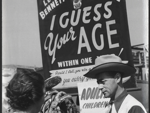 When it comes to age guessing, very few people think of the calculator feats such as the one in the previous post.
When it comes to age guessing, very few people think of the calculator feats such as the one in the previous post.
The first thing that usually comes to mind is carnival age-guessers. In this post, we'll take a closer look at age-guessing as a skill.
The best tips I've found on determining someone's age are in the article How to Guess Ages More Accurately. Since men tend to put less effort into hiding their age than women, here are a few extra tips on guessing a man's age.
Just knowing these tips isn't of much good without practice. Thankfully, there are several sites where you can practice guessing the age of random people:
• How Old Are You?
• Guess my Age
• Match>Age
Even though carnival age-guessers aren't having you put any numbers in a calculator, they're still able to use some very subtle math tricks. For example, instead of advertising that they'll hit your exact age, you'll usually see a margin of error such as, “I'll guess your age within 3 years!” That sounds quite close to most people.
If you think about it, however, a 3-year margin of error really isn't that close. If someone is 35, a guess of anywhere from 32 to 38 would be considered correct. In other words, all they have to do is be within the decade you were born in, and they'll be considered correct. The more experience they have, the smaller margin of error they can offer. For example, professional age-guesser Lee Bennett used an impressive 1 year margin of error.
Even more central to an age-guesser's actual purpose is the simple economics of the situation. Let's assume that the cost to have the carny make a guess is $3, and the cost per stuffed animal to the carnival is $.25 (since they buy them in bulk). If we assume the guess is wrong every time, perhaps to keep every customer flattered, they're making an 1100% profit on each prize!
As the guesser becomes more skillful, the profit margin goes up! If we assume the age-guesser can correctly guess the ages of 4 out of 5 people (an 80% success rate), then that's 5 people times $3/person or $15 they're taking in. Only 1 wrong guess out of those 5 means that they're giving up $.25 for every $15 they take in, a staggering 5900% profit margin!
So, when it comes down to it, age-guessing as a skill is all about the margin of error and the profit margin. And that's assuming they don't employ standard scams like writing two ages and then covering up the one that's farther away, using magician's techniques to write down a close answer after you state your age, or simply pickpocketing your wallet and looking at your ID.
Guessing ages is a skill, but only ever an approximate one at best. The mathematical approaches, as we've seen, offer precision. Perhaps the best approach is to develop the skill of age-guessing, and use math in a way that doesn't detract from the skill.
That's the approach we'll start developing in the next post in this series.
0
Age Guessing: Judging Appearances
Published on Thursday, April 26, 2012 in fun, money, self improvement
Related Posts
Post Details
Subscribe to:
Post Comments (Atom)




No Response to "Age Guessing: Judging Appearances"
Post a Comment